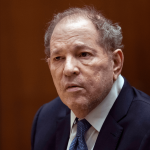The Opposite of God’s Intent
What is very crucial here is that the story of Abraham portrays this surrogacy as faithless, the opposite of God’s intent. You see, Sarah and Abraham were childless, just like Leah, just like so many couples in the dystopian world of The Handmaid’s Tale. God had promised Sarah and Abraham their own child, which would be a miracle because of their advanced age. But as time goes by and the birth of this child seems more and more impossible, Sarah comes up with a plan. She will force her maid, Hagar, to sleep with Abraham and thus produce a child. She would take matters into her own hands and help God out.
Of course, this doesn’t end well; it introduces all kinds of awful tensions between Sarah and Hagar. Sarah, deeply jealous of Hagar, banishes her. Tellingly, the angel of the Lord appears to Hagar and comforts her. This deeply unseen, invisible, oppressed woman says in response, “You are the God who sees me” (Genesis 16:13). The unseen one has been seen. She is told to go back and submit to Sarah for the time being. When later she is banished again, this time with her son Ishmael, God again comes to her and comforts her. The unimportant person on the margins of society is rendered important to God, for she is caught in the broken systems of a sinful world—and yet he does not forget her.
The story of Abraham, Sarah, and Ishmael is important because it shows us the kind of world that Jacob, Rachel, Leah, and the two slave women Bilhah and Zilpah lived in. It shows us that veering away from God’s intent in the beauty of monogamous marriage between man and woman, as established in creation, was causing increasing layers of dysfunction. Both stories are deeply unlike the world of The Handmaid’s Tale, where the forced surrogacy (brought about by state-sanctioned rape) is viewed as being done at God’s command. In the Genesis account, these actions are the opposite of God’s intent.
An Indictment of All Religion?
It would be easy to conclude that The Handmaid’s Tale is an indictment against all religion, merely a convenient critique of Christian Republicans. And, sure, there are some elements of that. And plenty of progressive websites are posting breathless stories about the series, taking the opportunity to stick it to Christian conservatives. But Margaret Atwood, the author of the book on which the series is based, wrote in the New York Times that her work is not meant to criticize religion per se:
In the book, the dominant “religion” is moving to seize doctrinal control, and religious denominations familiar to us are being annihilated. Just as the Bolsheviks destroyed the Mensheviks in order to eliminate political competition and Red Guard factions fought to the death against one another, the Catholics and the Baptists are being targeted and eliminated. The Quakers have gone underground, and are running an escape route to Canada, as — I suspect — they would. Offred [the main character, played by Elizabeth Moss in the Hulu adaptation, whose name has been changed to show who she is owned by—“Of Fred”] herself has a private version of the Lord’s Prayer and refuses to believe that this regime has been mandated by a just and merciful God. In the real world today, some religious groups are leading movements for the protection of vulnerable groups, including women.
So the book is not “antireligion.” It is against the use of religion as a front for tyranny; which is a different thing altogether.
















